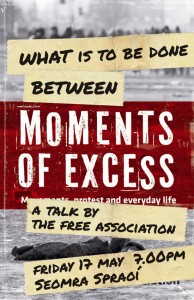A couple of us recently traveled to Dublin to speak at the “Struggles in Common” conference organised by our good friends the Provisional University. While we were there we did a talk at the Seomra Spraoi social centre, for which we created this rather fetching poster.  For this event we tried out some material which later ended up in our Rock ‘n’ Suicide article. The talk was well received and led to some really great discussions but looking back at the poster it’s apparent an important theme was lost between this talk and the subsequent article. The title of the talk, What is to be Done Between Moments of Excess, implies that what needs to be done during moments of highly intensive struggle might be different to what needs to be done during more ordinary times. This seems like a timely point for a couple of reasons. Firstly we are certainly in a period of low intensity struggle in the UK at the moment. Secondly because social movements seem to have taken on an explosive character in the post 2008 era. We weren’t sure if this was just a temporary phenomena after the 2011 protest surge ebbed away but 2013 has seen a repeated surge, although often in countries who had booming economies in 2011 which have fallen away since.
For this event we tried out some material which later ended up in our Rock ‘n’ Suicide article. The talk was well received and led to some really great discussions but looking back at the poster it’s apparent an important theme was lost between this talk and the subsequent article. The title of the talk, What is to be Done Between Moments of Excess, implies that what needs to be done during moments of highly intensive struggle might be different to what needs to be done during more ordinary times. This seems like a timely point for a couple of reasons. Firstly we are certainly in a period of low intensity struggle in the UK at the moment. Secondly because social movements seem to have taken on an explosive character in the post 2008 era. We weren’t sure if this was just a temporary phenomena after the 2011 protest surge ebbed away but 2013 has seen a repeated surge, although often in countries who had booming economies in 2011 which have fallen away since.
Given this recurrence of social explosions it seems useful to think how our ongoing politics might relate to such moments. This problem is usually posed as the need for more solid organisational forms to try and hold together the networks and experience that form during intense struggle. While this approach certainly isn’t wrong we might also ask whether political organisations and groups should alter what they do before such moments in expectation of their recurrence. Or to put that differently should we re-design our actions, organisational processes, etc., to facilitate their being picked up and adopted more widely when movements kick off? Indeed if we look at the way consensus-decision making techniques spread and influenced the flavour and direction of the movements of 2011 then we can get an idea of what’s possible. The other lesson of the spread of consensus assemblies, however, is that they may be fulfilling functions other than simple decision making, their true function may be, as Rodrigo Nunes suggests, “to act on the conditions of possibility of politics: in the context of profound disempowerment and a severe crisis impacting on highly atomised societies, they functioned as a space where the fabric of relations that one calls ‘the political’ could, at least for those who were there, be partially (re)constituted.” If this is so then the concepts, narratives, tactics, tools and technologies that we create will need the potential for a couple of moves ahead built into them, or at least contain the ability to re-assess and transform themselves in light of new possibilities.
To get back to our Irish trip the talk we gave at the ‘Struggles in Common’ conference focused on a similar argument but in relation to autonomous projects of social reproduction. We were, at least in part, responding to lazy opposing of antagonistic struggle to small-scale autonomous projects, an opposition that has castigated the latter as ‘localism‘ or ‘secessionism‘. We make the argument that in order to to win large scale antagonistic struggles, such as general strikes, we need to build up our ability to address the crisis of social reproduction in ways that don’t rely on the compliance and good will of capital or the State. After all what is a strike but the attempt by one side to provoke a crisis of capital accumulation and the response by the other side of provoking a crisis of social reproduction. Winning depends on which crisis becomes intolerable first. Anyway if you want to hear the argument put more fully then the talk is recorded here. Our talk is in panel two but I’d also recommend listening to the others on our panel, our good friend Gareth Brown talks about Plan C, of which we are also members, and Ana Mendez discusses the work and concepts of Observatorio Metropolitano.
There are recordings of other good talks from the day as well, not least that of one of our favourite historians, Peter Linebaugh. Indeed his style of presentation is so unusual, yet engaging, that someone wrote a post about it.

1 Comment